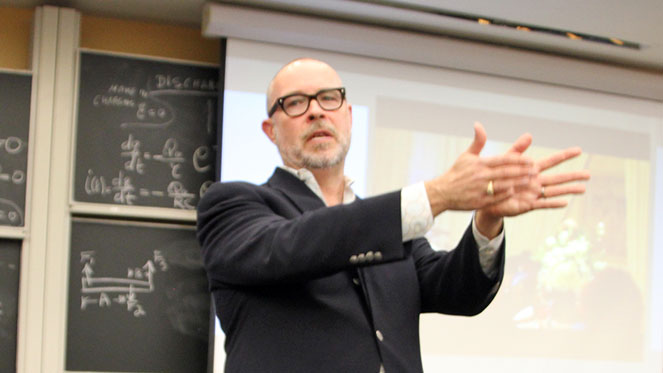
Who Is Coming Out and Why It Matters
Giler Lecture Explores Rapid Shifts in LGBT Demographics
By Emily Stimmel
When people learn what Gary J. Gates (HNZ’00) does for a living, the first question they often ask is, “How many gay people are there in the U.S.?” It may seem odd, but if anyone would know, it is Gates, a pioneer in LGBT demographic research.
Gates has collected data on LGBT populations that have impacted everything from pop culture to public policy. Statistics from his research have appeared on “Last Week Tonight with John Oliver” and “The Real O’Neals” and Siri even cites him when asked about gay and lesbian populations.
This fall, Gates presented Carnegie Mellon University’s 2016 Kim and Eric Giler Lecture in the Humanities, “LGBT Research: Science in the Public Square.” He described how his research has been used to support efforts to achieve marriage equality and to address disparities in healthcare, among other applications.
According to Tim Haggerty, for over a decade, the lecture series has given the CMU community an opportunity to hear from speakers whose expertise complements the work that takes place in the Dietrich College of Humanities and Social Sciences.
“Gates’ lecture was a tremendous addition to the series as it highlighted the role of humanistic inquiry in our academic conversation,” said Haggerty, director of the Humanities Scholars Program.
As a Ph.D. student in CMU’s H. John Heinz III College School of Public Policy, Gates wrote a dissertation that drew from U.S. Census data to analyze characteristics of same-sex couples and later co-authored “The Gay and Lesbian Atlas.” He received an Outstanding Recent Alumni Award from CMU in 2008 in recognition of these accomplishments.
During the lecture, Gates called his work “academic activism” and noted, “You don’t count in our society until someone counts you.”
He talked about trends in the field, like the higher number of women identifying as bisexual, increased identification of LGBT identities among non-white individuals and the challenges of capturing statistically significant data about transgender populations.
John Modell, professor emeritus of history, attended the talk to learn about the LGBT community from a social history perspective.
“Gates’ talk was superb in its restraint, good sense and good analysis. He laid out the strengths and weaknesses of the U.S. data on LGBT populations and trends, given definitional and data constraints,” said Modell.
Ariel Hoffmaier was intrigued by Gates’ work because she is writing a series of linked stories about LGBT identity for her senior honors thesis.
“I never before realized how huge a role statisticians have played in advocating for LGBT rights,” said Hoffmaier, a Dietrich College Honors Fellow who is majoring in creative writing and ethics, history and public policy.
Kim and Eric Giler established the Giler Lecture Series in 2003 to support visits from leading scholars and internal workshops for students in the Humanities Scholars Program and across campus. Kim Giler is a 1978 graduate of CMU with degrees in English and Spanish. Her husband, Eric, received an MBA from CMU in 1977.
In addition to the Humanities Scholars Program, which administers the Giler Lecture, CMU’s University Lecture Series, Alumni Association, Residential Education and the Office of the Assistant Vice Provost for Graduate Education sponsored the event.
Related Article:
LGBT Demographics Expert to Speak at CMU